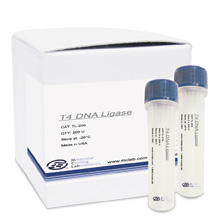-
DNA/RNA Ligases, Enzymes
E. coli DNA Ligase
E. coli DNA Ligase is a NAD+-dependent enzyme that catalyzes the formation of phosphodiester bonds between complementary 3′-hydroxyl and 5′-phosphoryl termini of dsDNA.
-
DNA/RNA Ligases, Enzymes
Taq DNA Ligase
Taq DNA Ligase catalyzes the formation of a phosphodiester bond in duplex DNA containing adjacent 5′-phosphoryl and 3′-hydroxyl termini, using NAD+ as a cofactor.
-
DNA/RNA Ligases, Enzymes
APE1
APE1, also known as HAP1 or Ref1, acts as an AP lyase by hydrolyzing the phosphodiester backbone at the 5′ end of an apurinic (AP) site, generating a 1 base…
-
DNA/RNA Ligases, Enzymes
T3 DNA Ligase
T3 DNA Ligase catalyzes the formation of a phosphodiester bond between a 5′ phosphate and a 3′ hydroxyl terminus in duplex DNA. The enzyme joins blunt ends and cohesive ends…
-
DNA/RNA Ligases, Enzymes
T4 RNA Ligase 2 (dsRNA Ligase)
T4 RNA Ligase 2, also known as T4 Rnl2 (gp24.1), has both intermolecular and intramolecular RNA strand joining activity. Unlike T4 RNA Ligase 1, T4 RNA Ligase 2 is much…

